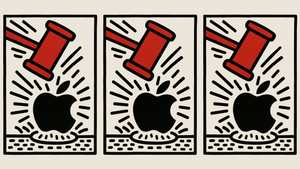Apple may have to pay out £1.5 billion in damages to UK consumers after losing a landmark lawsuit over its App Store fees, which were “excessive and unfair” according to a ruling by the UK’s Competition Appeal Tribunal.
It’s the second time this week that Apple’s App Store fees - long criticised by Spotify and other app developers - have been in the spotlight in the UK. Earlier this week the UK’s Competition & Markets Authority confirmed Apple’s mobile platform had ‘strategic market status’, allowing the regulator to now proceed with a new investigation into whether it should force changes to Apple’s App Store rules.
Both Apple and Google have faced formal regulator complaints and straight forward lawsuits over their respective app store fees in multiple countries, with app developers like Spotify and ‘Fortnite’ owner Epic Games instigating the complaints and litigation.
The case before the UK Competition Appeal Tribunal, which was filed in 2021, was interesting in that it was pursued on behalf of Apple users rather than app developments. Among those who could be eligible to share in the £1.5 billion damages are UK Spotify subscribers who bought a subscription via the streaming service’s iOS application in 2015 or 2016.
The class action was led by Dr Rachael Kent, a digital economy expert based at King’s College London. She says that Apple exploited its market dominance to charge unfair fees on in-app purchases that “added up to billions for the world’s richest company” and meant “less choice and innovation for everyone else”.
This week’s ruling, she adds, “sends a clear message: no company, however wealthy or powerful, is above the law”. If the damages do turn out to be in the region of £1.5 billion (nearly $2 billion), that will be a big deal, though Apple’s net income in 2024 was just under $94 billion.
Nevertheless, Apple unsurprisingly plans to appeal this week’s judgement, with a spokesperson telling reporters, “This ruling overlooks how the App Store helps developers succeed and gives consumers a safe, trusted place to discover apps and securely make payments”.
Under Apple’s original App Store rules, app developers were obliged to take in-app payments via Apple’s own transactions system, which charges a 30% commission (which ultimately goes down to 15% on repeat subscription fees). Another rule - the anti-steering provision - said that app developers couldn’t sign-post alternative payment options online where they could avoid paying Apple’s commission.
Spotify originally passed on the 30% commission to users who signed up for premium subscription via its iOS app, but that made it look like a Spotify subscription was three pounds more expensive each month than an Apple Music subscription.
In 2016 Spotify stopped selling new subscriptions via its iOS app, instead hoping users would think to visit its website to sign up. In 2023 it then forced anyone who had originally subscribed via its iOS app prior to 2016 to set up a new account via its website.
Under pressure from regulators and landmark court rulings elsewhere in the world, Apple has had to change its App Store rules in some countries, making it easier for app developers to sign-post alternative payment options. On the back of this ruling and Apple’s ‘strategic market status’, it could be forced to make more changes here in the UK.
In the class action before the Competition Appeal Tribunal, Kent’s lawyers argued that Apple exploited its dominant position in the smart phone market to impose “restrictive terms and excessive commissions” on app developers. On average, the lawyers estimated, app developers passed 50% of the overcharge onto consumers.
The tribunal agreed that Apple abused its dominant position to charge excessive fees. Another hearing next month will consider what damages the tech giant should pay. Those damages will be due to anyone who made an in-app purchase on an iOS app, between 1 Oct 2015 and 31 Dec 2020, which was subject to an Apple commission. It was Kent’s team that estimated damages could top £1.5 billion.
UK consumers who signed up to Spotify via its iOS app after 1 Oct 2015 and before the streaming service stopped taking in-app purchases may be eligible for a refund. As would UK consumers who accessed any other digital music products via an iOS app where Apple commissions applied.

